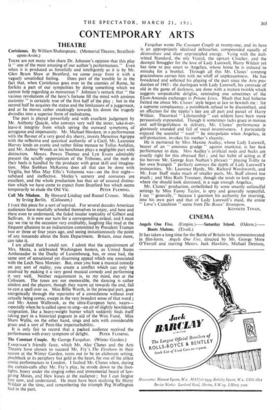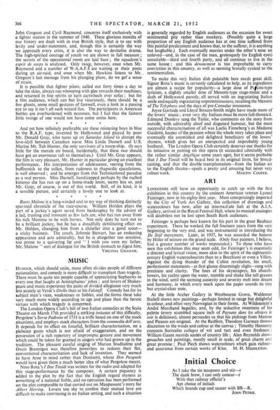CINEMA
Angels One Five. (Empire.) Saturday Island. (Odeon.)-- Boots Malone. (Tivoli.)
IT has taken a long time for the Battle of Britain to be commemorated in film-form. Angels One Five, directed by Mr. George More O'Ferrall and starring Messrs. Jack Hawkins, Michael Denison, John Gregson and Cyril Raymond, concerns itself exclusively with a fighter station in the summer of 1940. These glorious months of our history are dealt with in true British style, that is to say with levity and under-statement, and, though this is certainly the way we approach every crisis, it is also the way to devitalise drama. The high-spirited courage of youth we are shown in full measure ; the secrets of the operational room are laid bare ; the squadron's esprit de corps is analysed. Only twice, however, once when Mr. Raymond and a number of W.A.A.F.g are waiting at their posts during an air-raid, and once when Mr. Hawkins listens to Mr.. Gregson's last message from his plunging plane, do we gee a sense of strain.
It is possible that fighter pilots, called out forty times a day to take the skies, always ran whooping with glee towards their machines, and returned in fine spirits to turn cartwheels over sofas ; but for a film audience, which can but live vicariously, there should. be a few ghosts, some small gestures of farewell, even a look in a passing eye to say it isn't all such wizard fun. The participants in American battles are overburdened with neuroses, but I feel that the faintest little twinge of one would not have come amiss here.
* *
And yet how infinitely preferable are these roistering boys in blue to the R.A.F. type, invented by Hollywood and played by poor Mr. Donald Gray, who turns up on Saturday Island to disrupt the love-idyll between Canadian nurse Miss Linda Darnell and U.S. Marine Mr. Tab Hunter, the only survivors of a troop-ship. (It says little for the morale on board, incidentally, that these two should have got an enormous raft to themselves.) Until Mr. Gray appears, the film is very pleasant, Mr. Hunter in particular giving an excellent performance. His interpretation of adolescence, veering from the buffoonish to the sullen, from rudeness to rhapsodic ejaculations, is well observed ; and he emerges- from this Technicolored paradise as a real person. Miss Darnell, handicapped perhaps by the ruched kimono she has run up on a home-made loom, seems less so, and Mr. Gray, of course, is out of this world. Still, of its kind, it is a sensible picture, and certainly a lovely one to look at.
* * * *
Boots Malone is a long-winded and to my way of thinking distinctly spavined chronicle of the race-course. William Holden plays the part of a jockey's agent saved from bankruptcy by the advent of a lad, trusting and innocent as few lads are, who has run away from his rich Momma to be with horses. Not only does he turn out to be a brilliant jockey, but he has a dreadfully debilitating effect on Mr. Holden, changing him from a chiseller into a good scout— a sticky business. The youth, Johnnie Stewart, has an endearing appearance and acts admirably, but he is altogether too sensitive, too prone to a quivering lip and " I wish you were my father, Mr. Malone " sort of dialogue for the British stomach to digest him.
VIRGINIA GRAHAM.



































 Previous page
Previous page